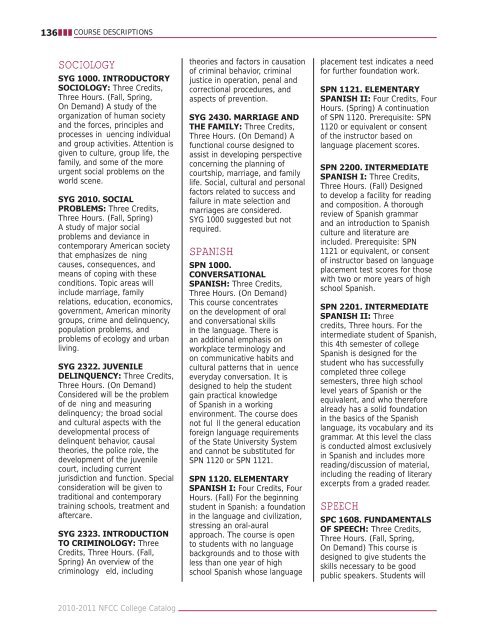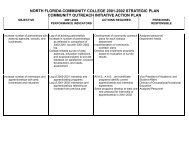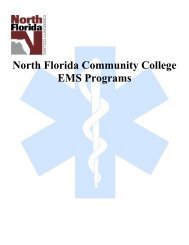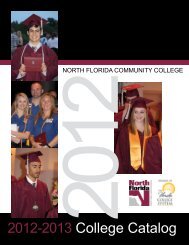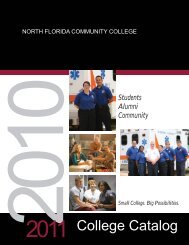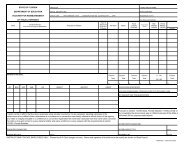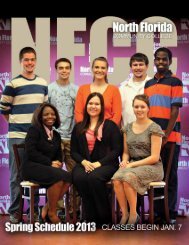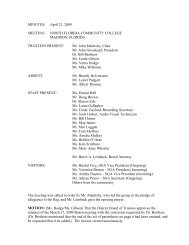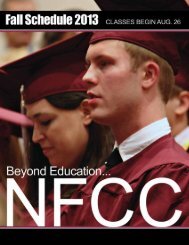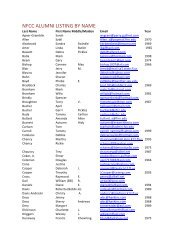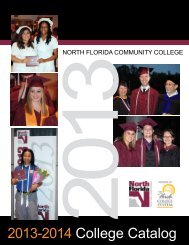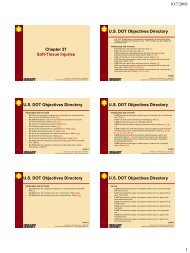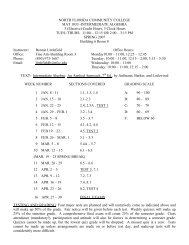2010-2011 College Catalog - North Florida Community College
2010-2011 College Catalog - North Florida Community College
2010-2011 College Catalog - North Florida Community College
You also want an ePaper? Increase the reach of your titles
YUMPU automatically turns print PDFs into web optimized ePapers that Google loves.
136<br />
COURSE DESCRIPTIONS<br />
SOCIOLOGY<br />
SYG 1000. INTRODUCTORY<br />
SOCIOLOGY: Three Credits,<br />
Three Hours. (Fall, Spring,<br />
On Demand) A study of the<br />
organization of human society<br />
and the forces, principles and<br />
processes in uencing individual<br />
and group activities. Attention is<br />
given to culture, group life, the<br />
family, and some of the more<br />
urgent social problems on the<br />
world scene.<br />
SYG <strong>2010</strong>. SOCIAL<br />
PROBLEMS: Three Credits,<br />
Three Hours. (Fall, Spring)<br />
A study of major social<br />
problems and deviance in<br />
contemporary American society<br />
that emphasizes de ning<br />
causes, consequences, and<br />
means of coping with these<br />
conditions. Topic areas will<br />
include marriage, family<br />
relations, education, economics,<br />
government, American minority<br />
groups, crime and delinquency,<br />
population problems, and<br />
problems of ecology and urban<br />
living.<br />
SYG 2322. JUVENILE<br />
DELINQUENCY: Three Credits,<br />
Three Hours. (On Demand)<br />
Considered will be the problem<br />
of de ning and measuring<br />
delinquency; the broad social<br />
and cultural aspects with the<br />
developmental process of<br />
delinquent behavior, causal<br />
theories, the police role, the<br />
development of the juvenile<br />
court, including current<br />
jurisdiction and function. Special<br />
consideration will be given to<br />
traditional and contemporary<br />
training schools, treatment and<br />
aftercare.<br />
SYG 2323. INTRODUCTION<br />
TO CRIMINOLOGY: Three<br />
Credits, Three Hours. (Fall,<br />
Spring) An overview of the<br />
criminology eld, including<br />
theories and factors in causation<br />
of criminal behavior, criminal<br />
justice in operation, penal and<br />
correctional procedures, and<br />
aspects of prevention.<br />
SYG 2430. MARRIAGE AND<br />
THE FAMILY: Three Credits,<br />
Three Hours. (On Demand) A<br />
functional course designed to<br />
assist in developing perspective<br />
concerning the planning of<br />
courtship, marriage, and family<br />
life. Social, cultural and personal<br />
factors related to success and<br />
failure in mate selection and<br />
marriages are considered.<br />
SYG 1000 suggested but not<br />
required.<br />
SPANISH<br />
SPN 1000.<br />
CONVERSATIONAL<br />
SPANISH: Three Credits,<br />
Three Hours. (On Demand)<br />
This course concentrates<br />
on the development of oral<br />
and conversational skills<br />
in the language. There is<br />
an additional emphasis on<br />
workplace terminology and<br />
on communicative habits and<br />
cultural patterns that in uence<br />
everyday conversation. It is<br />
designed to help the student<br />
gain practical knowledge<br />
of Spanish in a working<br />
environment. The course does<br />
not ful ll the general education<br />
foreign language requirements<br />
of the State University System<br />
and cannot be substituted for<br />
SPN 1120 or SPN 1121.<br />
SPN 1120. ELEMENTARY<br />
SPANISH I: Four Credits, Four<br />
Hours. (Fall) For the beginning<br />
student in Spanish: a foundation<br />
in the language and civilization,<br />
stressing an oral-aural<br />
approach. The course is open<br />
to students with no language<br />
backgrounds and to those with<br />
less than one year of high<br />
school Spanish whose language<br />
placement test indicates a need<br />
for further foundation work.<br />
SPN 1121. ELEMENTARY<br />
SPANISH II: Four Credits, Four<br />
Hours. (Spring) A continuation<br />
of SPN 1120. Prerequisite: SPN<br />
1120 or equivalent or consent<br />
of the instructor based on<br />
language placement scores.<br />
SPN 2200. INTERMEDIATE<br />
SPANISH I: Three Credits,<br />
Three Hours. (Fall) Designed<br />
to develop a facility for reading<br />
and composition. A thorough<br />
review of Spanish grammar<br />
and an introduction to Spanish<br />
culture and literature are<br />
included. Prerequisite: SPN<br />
1121 or equivalent, or consent<br />
of instructor based on language<br />
placement test scores for those<br />
with two or more years of high<br />
school Spanish.<br />
SPN 2201. INTERMEDIATE<br />
SPANISH II: Three<br />
credits, Three hours. For the<br />
intermediate student of Spanish,<br />
this 4th semester of college<br />
Spanish is designed for the<br />
student who has successfully<br />
completed three college<br />
semesters, three high school<br />
level years of Spanish or the<br />
equivalent, and who therefore<br />
already has a solid foundation<br />
in the basics of the Spanish<br />
language, its vocabulary and its<br />
grammar. At this level the class<br />
is conducted almost exclusively<br />
in Spanish and includes more<br />
reading/discussion of material,<br />
including the reading of literary<br />
excerpts from a graded reader.<br />
SPEECH<br />
SPC 1608. FUNDAMENTALS<br />
OF SPEECH: Three Credits,<br />
Three Hours. (Fall, Spring,<br />
On Demand) This course is<br />
designed to give students the<br />
skills necessary to be good<br />
public speakers. Students will<br />
<strong>2010</strong>-<strong>2011</strong> NFCC <strong>College</strong> <strong>Catalog</strong>


